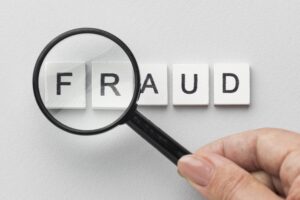
A vital component of our lives, insurance offers financial stability and mental peace of mind during unpredictable times. We rely on these plans, whether they be for health insurance, auto insurance, or home insurance, to guard us against unforeseen costs. However, some people take advantage of insurance programs by committing fraud, which eventually raises prices for everyone. In this article, we will explore the world of insurance fraud, understand its consequences, and discuss ways to recognize and avoid falling victim to it.
What is Insurance Fraud?
Any deceptive act carried out with the goal of obtaining an unauthorized advantage from insurance coverage is referred to as insurance fraud. It may involve one or more people, a group, or even a network of organized criminals. The deceptive behavior might take many different shapes, including:
Staged accidents: Intentionally staging a car accident or fabricating injuries to obtain insurance benefits.
Exaggerated Claims: Inflating the cost of missing or damaged goods in a claim in order to get a bigger reimbursement.
Fake Policies: Selling false insurance policies to unwary people or companies, leaving them vulnerable and unprotected when they most need it.
Premium Fraud: Premium fraud is the practice of giving insurance companies misleading information in order to obtain lower premiums, such as by portraying a vehicle’s principal usage.
The Consequence of Insurance Fraud
All of us are impacted by insurance fraud, which raises premiums and erodes confidence in insurance institutions. Let’s explore a few effects of insurance fraud:
Financial Loss: Each year, false claims cost insurance companies billions of dollars. Higher premiums are subsequently passed down to policyholders as a result of these losses.
Increases in rates: As insurance firms suffer losses, they increase rates to offset the cost of fraud. Since most fraud is committed by a small number of people, honest policyholders wind up paying more.
Limited Coverage: To reduce the danger of fraud, insurance firms are becoming stricter with their policies and enforcing harsher terms and conditions. For loyal policyholders, this may result in decreased coverage or higher deductibles.
Legal Consequences: Insurance fraud is a crime that carries legal repercussions. Offenders may be subject to fines, jail time, and reputational damage that may have an impact on both their personal and professional lives.
Recognizing Insurance Fraud
The first step in protecting yourself is learning potential indicators of insurance fraud. These warning signs of possible fraud are listed below:
Suspicious Documents: Documents that seem to have been edited, contain conflicting information, or lack specifics should be avoided. Check for any indications of fabrication on bills, invoices, medical records, and repair estimates.
Excessive or Unusual Claims: Claims that Seem Disproportionately High or Involve Unusual Circumstances: Claims that Seem Excessively High or Involve Unusual Circumstances may be signs of fraud. For instance, a sudden increase in medical care after an accident can raise questions.
Pressure Tactics: Fraudsters may use pressure to get you to make snap judgements or sign paperwork without fully comprehending its repercussions. People that try to push you through the procedure should be avoided.
Lack of Cooperation: If a party to an accident or claim is reticent or uncooperative in providing the information required, it may be a hint that they are trying to hide fraudulent activity.
Avoiding Insurance Fraud
Insurance fraud can be avoided by being vigilant and taking preventative action. To reduce your chance of becoming a victim, take into account the following advice:
Find Insurance Companies: Investigate the reputation and financial standing of the insurance provider in-depth before buying a policy. Look for any complaints or unfavorable comments that can cast doubt on their credibility.
Verify Information: When applying for insurance, be sure to give true and accurate information. False statements of the truth or the concealing of information may result in the denial of claims and possible legal repercussions.
Carefully review the policies: Make sure you are familiar with the conditions of your insurance policy. To prevent any unpleasant surprises while submitting a claim, be aware of the coverage limitations, deductibles, and exclusions.
Keep Records: Keep thorough records of all communications with your insurance provider, including letters, emails, and correspondence pertaining to claims. In the event of a disagreement, these documents may be used as evidence.
Report Suspected Fraud: Contact your insurance provider or the appropriate authorities if you suspect insurance fraud. Your action may aid in preventing others from being a victim of scams.
Conclusion:
Insurance fraud is a significant threat to people, companies, and society at large. We may prevent falling victim to insurance fraud by being aware of the different types of it and cautious. Avoiding fraud and preserving the integrity of insurance systems depends on seeing warning signs, checking facts, and taking preventative action. Keep in mind that insurance is a shared duty, and that by remaining aware and alert to suspicious activity, we all help to create a more secure and safe insurance environment.
